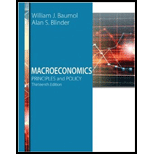
To describe: The four main components of aggregate
Answer to Problem 1TY
Four main components are consumption, investment, Government expenditure and net exports.
Largest component is consumption expenditure and the smallest one is net exports.
Explanation of Solution
The four main components are as follows:
Consumption: It can be stated as the spending for purchasing goods and services. It always depends positively on the disposable income and depends on the size of income and marginal propensity to consume. The consumption will be greater when the disposable income is greater.
Investment : It is to enhance the productivity by adding to the existing capital. It can be machinery, payment for additional labor, addition of stock capital, etc.
Government expenditure : This includes the purchase of goods and services by government at a point of time and is denoted by G.
Net exports: It can be defined as the difference between imports and exports. The money value will be more when exports are greater than the imports and vice versa.
The aggregate demand can be calculated by the equation.
From the above equation, it is clear that the aggregate demand is the sum of consumption, investment, government expenditure and net exports.
The largest component is the consumption expenditure as it constitutes of two-third of the overall expenditure. While net exports is the smallest component as it is the difference between the imports and exports, the value of this difference would be smaller
Introduction: Aggregate demand is an economic indicator of the overall demand for all finished goods and services produced in an economy. At a given price level and point in time, aggregate demand is defined as the cumulative amount of money traded for certain goods and services.
Want to see more full solutions like this?
Chapter 8 Solutions
Macroeconomics: Principles and Policy (MindTap Course List)
- What change does recession has on the price and output level when the change in aggregate demand is more than change in aggregate supply ?arrow_forwardHow do changes in expectations, fiscal policy and monetary policy, and the world economy change aggregate demand and the aggregate demand curve?arrow_forwardState the main components of the aggregate demand in the economyarrow_forward
- Suppose that the price index of 150 for quantity demanded of US Real GDP is 10.0 trillion worth of goods. Do these data represent aggregate demand or a point on an aggregate demand curve? Explain your answer.arrow_forwardWhat effect would an increase in aggregate supply have on price levels and GDP?arrow_forwardDiscuss 4 components of aggregate demand? Find the largest and smallest component.arrow_forward
- What effects would increase in aggregate supply have on price levels and GDP?arrow_forwardWhat change does recession has on the price and output level when the change in aggregate demand is less than change in aggregate supply ?arrow_forwardDraw the graph (aggregate supply and aggregate demand curves) of an economy that is in equilibrium.arrow_forward
 Economics Today and Tomorrow, Student EditionEconomicsISBN:9780078747663Author:McGraw-HillPublisher:Glencoe/McGraw-Hill School Pub Co
Economics Today and Tomorrow, Student EditionEconomicsISBN:9780078747663Author:McGraw-HillPublisher:Glencoe/McGraw-Hill School Pub Co
 Economics (MindTap Course List)EconomicsISBN:9781337617383Author:Roger A. ArnoldPublisher:Cengage Learning
Economics (MindTap Course List)EconomicsISBN:9781337617383Author:Roger A. ArnoldPublisher:Cengage Learning







